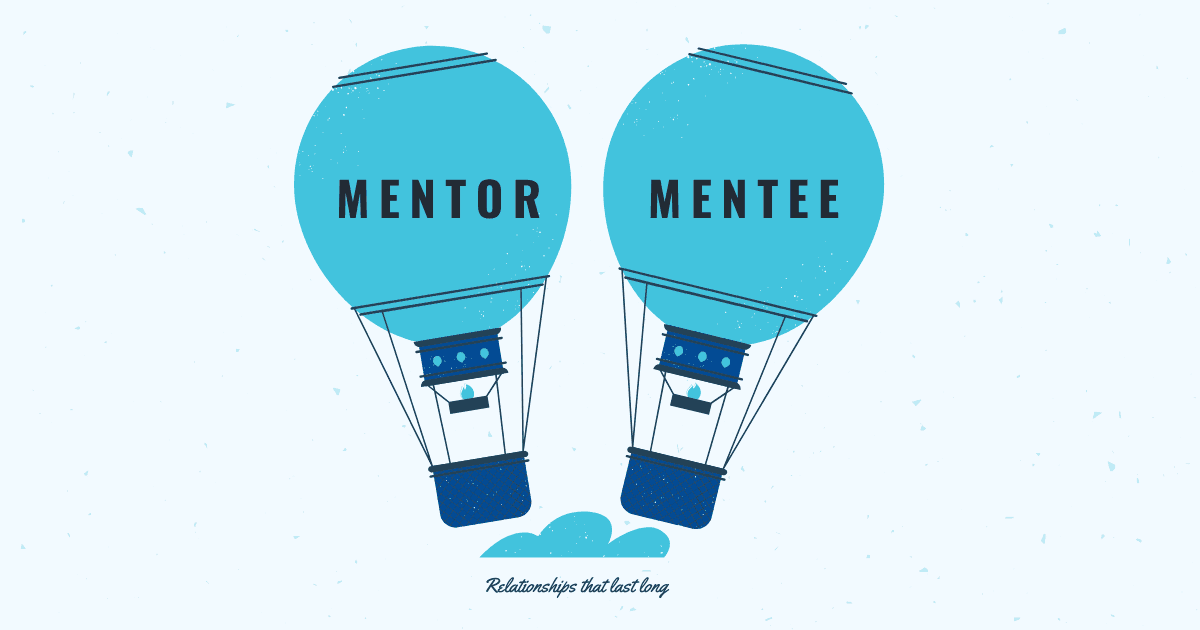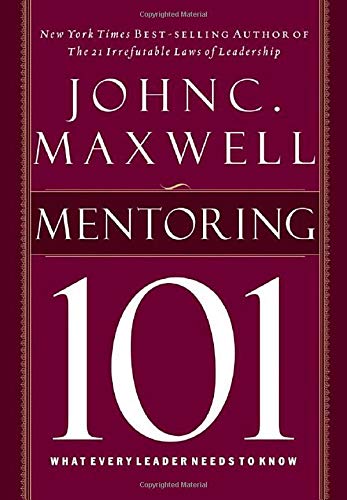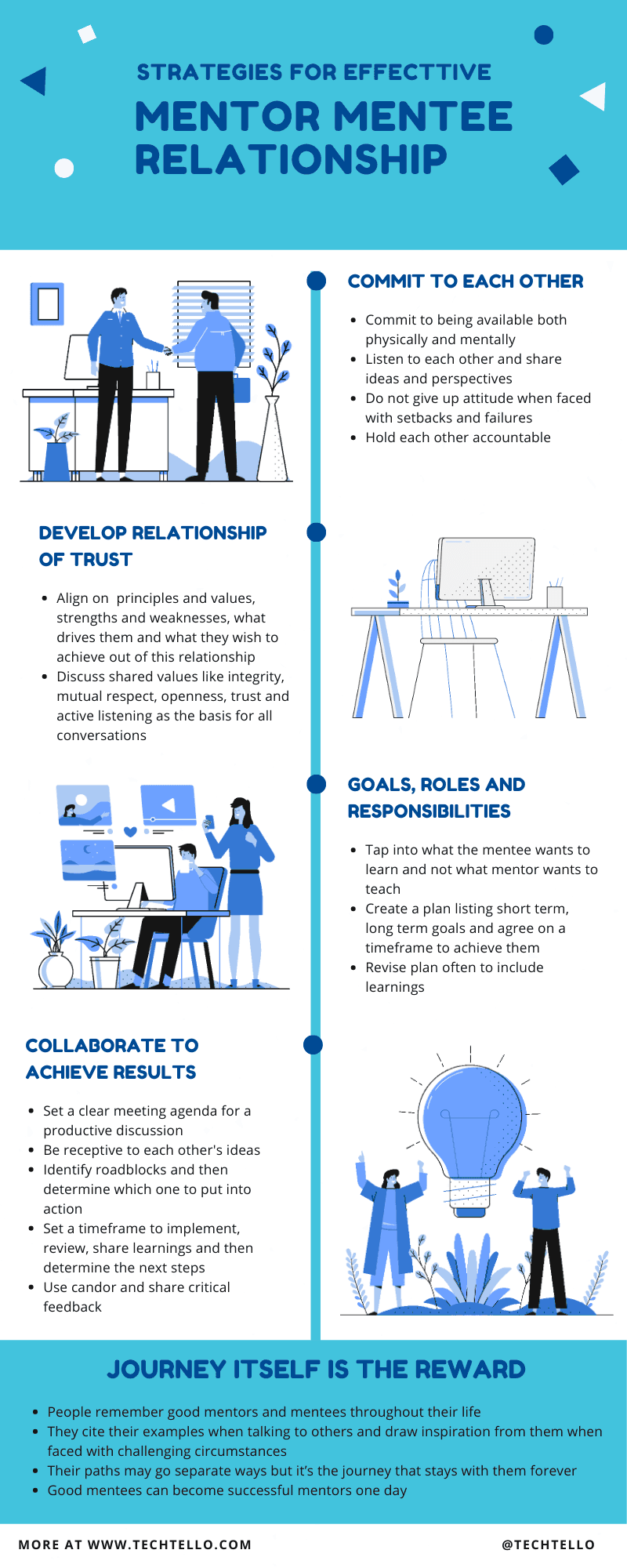Mentorship: Key To Effective Mentor Mentee Relationship

Mentor and mentee are common titles granted to employees in the workplace with little clarity on the role they play or how the relationship should benefit both the parties.
We live in a world where knowledge is considered power and people with knowledge feel entitled to have opinions and pass judgement. Mentoring in the workplace has transpired into a program where a mentor’s role is to only give advice devoid of commitment and connect to the mentee’s actual goals.
Mentor is viewed as the advisor in the relationship with mentee being the party benefiting from the relationship. So, while it looks this way, effective mentorship is actually a two-way conversation in which both parties feel committed to the problem and share a desire to learn from each other.
There’s no denying that mentoring is an incredibly valuable experience essential for growth and development. Setting up the right mentor mentee relationship involves creating a safe and supportive environment where both mentor and mentee can engage in building trust, setting goals and achieving them through creative problem solving and solutioning.
While mentor mentee is a relationship in which one cannot exist without the other, there’s a clear separation between their roles. Let’s learn about their roles before developing an effective strategy for this relationship.
What is the role of mentor?
Mentor is a person with expertise, experience or knowledge which is valuable to others and holds strong beliefs about helping others by sharing this knowledge with the world.
They act as the guide, advisor and support structure to bring out the best in people by learning about their strengths and leveraging it to co-create solutions.
They understand that people have different learning styles and experiments with them to find the one best suited to the individual.
A great mentor is also aware that every individual has unique circumstances and problems. Advice that works for one may not apply to another person. This helps them in learning the unique challenges of their mentee and to provide advice tailored to them.
While a mentor shares their perspective, learnings and advice based on their past experience, they know the value of giving space and time to the other person to develop their own solutions. They encourage them to look beyond their own mental blocks and avoid mistakes they have made in the past. They do not feel threatened by or reject an idea that does not align with their beliefs. They rather encourage it by listening actively to the other person and giving them a chance to explore it.
An important note for mentors from book Lean In by Sheryl Sandberg
Communication starts with the understanding that there is my point of view (my truth) and someone else’s point of view (his truth). Rarely is there one absolute truth.
They provide constructive feedback to help the other person improve and treat this relationship as an opportunity to grow by never failing to seek feedback on how they can do better.
In summary, a great mentor asks these questions frequently:
“How can I help the other person?”
“Am I being biased or closed minded while listening to the other person?”
“Do I encourage them to share their viewpoint?”
“Do I hold them accountable?”
“What do I expect to gain from this relationship and where do I stand at this moment?”
“Am I feeling excited or nervous about this relationship?”
“How can I encourage them to do better?”
“Am I being honest in my feedback?”
What is the role of mentee?
Mentee is the other side of the mentor mentee relationship who sets its tone. Mentee drives the relationship by determining the role model they wish to emulate and the goals they need to achieve through them.
They understand that it’s a relationship that grows over a period of time and builds upon their actions. They are either completely bought in to the advice from their mentor and act on it or do not hesitate to share and voice their opinion when it conflicts with their ideas.
They take full responsibility for keeping their mentor in the loop when they wish to deviate from original agreement or decide to follow a completely different path based on their learnings along the way.
A great mentee knows the areas of their growth and development and seeks the kind of person they respect based on the knowledge they possess. They may lean on multiple people for mentorship as they find their limitations and set learning boundaries for themselves. They try to imbibe the best of each of their mentors.
In summary, a great mentee asks these questions frequently:
“Why is this person right for me as a mentor?”
“Why should my mentor help me?”
“Do I understand what my mentor desires from the partnership? How can I provide it?”
“Am I being honest in my work and making best use of their time?”
“Do I feel open to share my ideas? Am I being heard?”
“How am I doing against my goals? Do I need to revisit them?”
“What can I do more to grow this relationship?”
“Do I take their feedback seriously?”
Strategies for building an effective mentor mentee relationship

Mentor mentee is a relationship built out of personal connection and mutual respect. Much like cultivating a land, cultivating a relationship takes time as it requires building trust and aligning with each other’s values.
Relationships also grow over time. Living in the old may require sticking to the relationship that you do not desire or continuing with old ways of doing things when there are new and better ways of achieving the same objectives. So while a relationship may have served us well so far, it’s a good idea to evaluate and understand how it will benefit us with our future needs. Revisit, introspect and determine what needs to change based on the new knowledge.
I will discuss 4 key effective strategies to develop mentor mentee relationship that lasts long and grows with its people:
Strategy #1: Commit to each other
Mentorship is not a “do it on the side” or “when I get time” job. It’s real hard work that requires dedication and commitment much like any other part of our job.
Apart from time being of paramount importance to succeed in a mentor-mentee relationship, it also requires a tremendous amount of energy to engage, guide, deal with the ups and downs and all possible human emotions that come into play when two people are trying to achieve something significant.
A true meeting of the minds requires commitment to each other and their time. Set time boundaries, define protocol to cancel, agree on the medium to contact (email, f2f) depending on the issue. It’s highly advisable that both mentor and mentee write down their commitments and refer to them from time to time.
A mentor may write their commitment as:
- I commit to be available to my mentee at our agreed upon time both physically as well as mentally
- I will be honest in my advice and will not withhold any information or state anything that I do not believe to be true
- I will engage in active listening and be open to hearing my mentee’s ideas without applying my personal filters in the form of my beliefs and thoughts
- I take responsibility to help my mentee succeed in their goals
- I will hold my mentee accountable and will not refrain from sharing my true feelings and thoughts about them
A mentee must write their commitment as well:
- I commit to be available to my mentor at our agreed upon time both physically as well as mentally
- I will take my mentor’s advice seriously and be open to share my perspective and ideas
- I will work hard to act on the advice and share my learnings with them
- I may fail multiple times, but will not give up without trying
- I take complete responsibility for my own success
- I will be honest in my feelings and thoughts with my mentor
Strategy #2: Connect to develop a relationship of trust
Both mentor and mentee must align on their principles and values to mutually benefit from the relationship. Without establishing them first, a value clash later may cause feelings that can obstruct both sides to continue effectively.
Form a personal connection, understand each other’s principles and values, strengths and weaknesses, what drives them and what they wish to achieve out of this relationship. Discuss shared values like integrity, mutual respect, openness, trust and active listening as the basis for all conversations.
As much as possible, take time out to engage in face to face conversation (video, in-person). It’s not enough to hear a person’s words. Their body language, facial expressions and emotions play a large role in understanding their true intent.
Strategy #3: Plan to establish goals and define roles and responsibilities
A mentor mentee relationship that’s based on ad hoc needs without establishing clear goals does not last long. Creating a learning environment requires tapping into what the mentee wants to learn and not what mentor wants to teach.
Mentees must take on the driver’s seat and list down their goals that they wish to achieve with mentor’s help. Together they must create a plan listing short term, long term goals and agree on a timeframe to achieve them.
Peter Drucker shares a very important insight from his book, The Effective Executive
The action plan is a statement of intentions rather than a commitment. It must not become a straitjacket. It should be revised often, because every success creates new opportunities. So does every failure.
Sometimes, it may take multiple iterations to achieve the desired result. Mentor and mentee must hold each other accountable to be part of the entire process and not give up when faced with multiple failures and setbacks.
Together they must establish clear roles and responsibilities and basic guidelines for working together by answering these questions:
“Who will do the prep work? What should be part of it”
“How should problem be formulated”
“What data is necessary for an argument in favour of/against an idea”
“How will solutions be implemented”
“What’s the best way to share learnings”
“What will be the basis to prioritise new ideas”
Amazing Goal Planner
Become your best self by setting and achieving goals in all important areas of your life.
Strategy #4: Collaborate to achieve results
Act. A great plan is of no use without putting it into action.
Set a clear meeting agenda and hold each other accountable to be prepared for a productive discussion based on earlier agreement of roles and responsibilities. Be receptive to each other’s ideas, work collaboratively to brainstorm them, identify roadblocks and then determine which one to put into action.
Apply first principles thinking to explore beyond your self imposed limitations and inversion mental model to switch your brain from a normal way of thinking to the one that will give you the answers to move forward.
Set a timeframe to implement, review, share learnings and then determine the next steps.
For a mentor, it’s absolutely critical to adopt a positive style to make a change. Follow these tips while collaborating with your mentee:
- Appreciate mentee even when they make small progress
- Use candor and share critical feedback. Do not ignore even if it’s small
- Criticise the behavior and the choices. Do not ever criticize the person
- Encourage them to do more, better
The journey itself is the reward
The mentor mentee relationship does not end once mentee achieves their desired goals. The deep bond formed during these years lasts forever.
People remember good mentors and mentees throughout their life. They cite their examples when talking to others and draw inspiration from them when faced with challenging circumstances.
Their paths may go separate ways but it’s the journey that stays with them forever.
Remember, good mentees can become successful mentors one day. Do your best to create this beautiful relationship that sows the seeds for many more in future. I am excited to see you apply it in your work environment and in personal life.
Recommended Reading
What’s your experience on being a mentor or a mentee? What did you gain out of the relationship? How will you do it differently now? Write to me or share your thoughts in the comments below.



































Thanks for sharing information. With these information I would like to generate a simple application for both mentee and mentor.
Hi Anil,
What kind of an application do you have in mind for mentor and mentee?
Thanks,
Vinita
Thank you
Thanks for taking the time to read Ivona
Excellent advices and ways to help each other to bond as a team.
Thank you Benjamin!
Good article to read on tips for a balanced Mentor-Mentee relationship and a positive sum mentorship journey. Thank you.
Thanks for reading
It’s great that you talked about how a great mentor is aware that every individual has unique circumstances and problems. I was reading a newspaper earlier and I read one article that talked about youth mentorship programs. Mentors could provide some much-needed assistance to people, so I could definitely see the value of having one.
Thank you for the direct content on building mentor/mentee relationships. I found it very helpful in starting a conversation with my mentor.
Hello Vinita, I enjoyed the information presented. Reading your article clarified important information concerning the responsibility of the mentor and the mentee relationship. You brought an interesting point that I had not considered before, the relationship if good will the mentor examples to use as he/she continue to help others on their journey. Thanks!